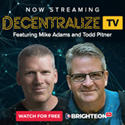
Interview with Loren McDonald, vice president of marketing at EmailLabs
 Tuesday, April 11, 2006 Tuesday, April 11, 2006by Mike Adams, the Health Ranger Editor of NaturalNews.com (See all articles...) Tags: email marketing, can spam, spam |
- Newly released JFK files reveal Pentagon's role in creating Lyme disease and covid in the same lab
- Discovery of vast underground city beneath Giza pyramids challenges human history
- Black cumin seed oil emerges as a powerful ally against breast cancer and chronic inflammation
- Sugar-free deception: Artificial sweeteners hijack hunger signals, fuel obesity epidemic, study warns
- Catastrophic 7.7 earthquake devastates Myanmar and Thailand; death toll could reach 100,000
- Kiss Your Genetic Privacy Good-Bye! 23andMe Gets Green Light to Sell Your Intimate Genetic Details to Anyone They Want
- AI breakthrough slashes celiac disease diagnosis time from months to minutes
- Europe braces for WAR as EU urges citizens to STOCKPILE FOOD, in latest provocations with Russia
- Aluminum pollution: A silent threat to human health
- Thomas Massie’s Dual Loyalty Disclosure Act aims to restore American sovereignty by cracking down on foreign influence in Congress
- Dr. Suzanne Humphries makes bombshell appearance on Joe Rogan podcast, exposing vaccine industry deception back to POLIOMYELITIS
- The cancer fear industry: How big pharma profits from panic-and what natural alternatives offer
- The mighty Eggplant: An underrated superfood with ancient roots
- 200 Tesla showrooms bracing for Saturday protests as movement against Musk escalates
- Is the vaccine-autism debate reopening? Washington Post sparks controversy with preemptive hit piece on David Geier
- A handful of pecans a day could keep heart disease at bay, study finds
- The great crypto power struggle: How technocrats and governments are reshaping global finance
- Trump administration reportedly preparing for military strikes on Iran, raising fears of escalation
- Newly released JFK files reveal Pentagon's role in creating Lyme disease and covid in the same lab
- Analysis: The coming economic collapse, a mass uprising and Trump's three secret weapons to halt the growing revolt
- Trump nominates VACCINE ZEALOT Susan Monarez to lead the CDC, sidelining RFK Jr.'s reform efforts
- Trump's greatest betrayal so far: Accelerating Middle East wars, silencing dissent, and serving Zionist masters
- Dr. Mike Yeadon releases 15-minute testimony - WATCH - about genocidal intent of COVID “vaccines”
- Festive flavors: The sweet history, nutritional profile and health benefits of pecan pie
- Elon Musk: Aliens could be here on Earth RIGHT NOW
- Big Pharma's $8 Billion bribery scheme exposed: how doctors are pushed to prescribe junk science, not heal
- 5 Simple steps to boost your brainpower: How to strengthen executive function in a distracted world
- Trump reverses course on Gaza plan, says “nobody is expelling Palestinians”
- A lack of integrity in Academia: Harvard professor found GUILTY of fraudulent research to promote CRT theory
- Reclaim your health: How midlife exercise reverses years of inactivity
- Survival 101: Effective EMF blocking techniques
- Florida takes a stand: DeSantis proposes permanent ban on mRNA vaccine mandates
- Sugarcane extract superior to cholesterol-lowering drugs?
- California's social media censorship law struck down: A victory for free speech or a threat to online safety?
- OpenAI whistleblower who dissented against how the company trained ChatGPT found dead
- EPA advisor admits the agency is funneling billions to climate groups ahead of Trump’s return to White House
- EPA advisor admits the agency is funneling billions to climate groups ahead of Trump’s return to White House
- Newly released JFK files reveal Pentagon's role in creating Lyme disease and covid in the same lab
- California's social media censorship law struck down: A victory for free speech or a threat to online safety?
- Dr. Mike Yeadon releases 15-minute testimony - WATCH - about genocidal intent of COVID “vaccines”
- The Health Ranger releases “Vaccine Zombie” song and music video, using AI-animated zombies for the music video
- The pandemic as a tool for INDOCTRINATION: Understanding “The Indoctrinated Brain” by Dr. Michael Nehls
- Florida takes a stand: DeSantis proposes permanent ban on mRNA vaccine mandates
- “Why we influenced the 2020 elections”: Facebook files reveal the coordinated effort to bury the Hunter Biden laptop story
- Mike Adams releases country western hit single: Goin’ Back in Time is Comin’ Home
- Mike Adams releases music poetry sensation: A Child of God
- Unpacking the Lies That We’ve Been Fed – new song and music video released by Mike Adams, the Health Ranger
- Michigan sheriff announces criminal investigation into 2020 election crimes, Dominion Voting Systems
- Migrants are taking advantage of recent hurricanes to scam residents and loot their homes
- House Intelligence Committee calls for the ARREST and PROSECUTION of Dr. Anthony Fauci
- RFK Jr. clears key hurdle: Sen. Susan Collins backs controversial HHS nominee, signaling a new era for health policy
- Rep. Nancy Mace introduces bill to ban biological males from female facilities on federal property
- Peter Rost exposes Big Pharma corruption in his book “The Whistleblower: Confessions of a Healthcare Hitman”
- Mike Adams releases new song and music video: Nothing More Disgusting Than a Globalist
- Red Cross issues warning to stop blood plasma donations from vaccinated people
- Scientists confirm: GENIUS brain function can be spontaneously unleashed in humans without any apparent cause
- EPA advisor admits the agency is funneling billions to climate groups ahead of Trump’s return to White House
- HYSSOP: What research reveals about the health benefits of this ancient holy herb
- Two containers with completed ballots fall out of truck in Florida
- Fully vaccinated about to see “tsunami” of illness and death, warns virologist
- Global leaders unite to clamp down on “misinformation” with UN-backed Cascais Declaration
- BREAKING: 2025 NDAA authorizes mandatory military draft of WOMEN across America… as Pentagon pursues global NUCLEAR war with both Russia and China at the same time
- Michael Yon warns of a ZIONIST TAKEOVER in Trump’s second administration
- BOMBSHELL: DNA testing kits are a SCAM to develop ethnic-specific bioweapons
- Ozempic and Wegovy weight loss drugs are injectable LIZARD VENOM PEPTIDES that may unleash a devastating wave of organ failure… side effects align with symptoms of SNAKE BITES
- Israeli soldiers accused of even more torture and abuse in the West Bank
- These 13 countries just signed an agreement to engineer a global FAMINE by destroying food supply
- NASA admits that climate change occurs because of changes in Earth’s solar orbit, and NOT because of SUVs and fossil fuels
- RFK Jr. clears key hurdle: Sen. Susan Collins backs controversial HHS nominee, signaling a new era for health policy
- Sermon 30: How Jesus reveals Caesar’s FAKE CURRENCY and FALSE AUTHORITY
- Coriander seeds: Ancient medicine backed by modern science
- Arizona officials claim Maricopa County needs 10-13 days to tabulate results of the election
McDonald: Thank you. I'm enjoying being here.
Mike: For those who aren't familiar with EmailLabs, could you give some background of what EmailLabs does and your own involvement with the firm?
McDonald: EmailLabs has been around almost five years now. As you mentioned, we're positioned as one of the leading high-end, self-service email marketing technology companies out there. We primarily provide clients with what's called ASP, which are basically web-based solutions. You can do all of your creative endeavors, list management, distribution and managing your reporting online.
What we provide are some of the most advanced technology features out there for marketers. Things like using an ATI to integrate and sync up information with their CRM databases and sales force automation databases.
Then there is advanced segmentation and those kinds of things, so you can segment your customer list based upon very specific actions that people have taken, such as clicking on a particular link. They can segment your customer base by looking at their prior activities and an unlimited amount of demographic data. We're really focused on clients who want a sophisticated technology. Our clients have the capabilities in-house to run our programs as opposed to using an agency approach where they outsource email marketing programming services. We provide you the know-how and in-depth customer support. Basically, our clients are outsourcing the technology, but running their program themselves.
Mike: Is there a consulting component to any of this? For example, helping customers decide how they might want to segment their list, or what triggers they might want to put in place?
McDonald: Yes, absolutely. In addition to my role as VP of marketing, I actually do consult with a number of clients. We'll run them through an overview of email best practices -- everything from how to write great subject lines and segment lists to understanding stamp holders and those types of things. We aren't positioned like a major agency. Our core business is really technology, but we are finding an increasing demand, and we're filling it by providing assistant services. We help our clients with best practices, consulting and training to help them optimize their programs.
Another growing area is the creation and design of email templates up front. Clients are realizing how complex it is to understand all the different email clients and ISP issues. They'll come and say, "You understand this, so why don't you design and program the template?" Then people can go back to a kind of a self-service model. People who don't have HTML coding experience can go in and edit various regions in the templates every month, or whenever they send it out.
Mike: There seems to be an intimate level of handshaking or consulting with each client. There are so many areas of technical expertise that a customer needs to have a handle on these days. Most of them, when they are starting out, don't really know where to start, right?
McDonald: Email marketing is still a young industry. It's quite a new tactic for a lot of marketers. It's only been around a half-dozen years. There's not a supply of tens of thousands of email marketing professionals out there in the marketplace that companies can hire to come in and run their programs.
So, when you think about those people, it's impossible for them to keep up on things. That's why the best practices, resources, training and the kind of the assisted consulting services are really becoming huge for us. I think that's where the industry is going, as people just need constant advice on how to get their program off to a great start or how to continue to improve it.
Mike: Sure.
McDonald: For example, I have one e-commerce client that I consult with on an ongoing basis. We have a long-term plan of how to get him to an Amazon-type level of sophistication in terms of email marketing. We're only halfway there because the person who I interface with has multiple jobs. He's been managing the website, designing and putting up product photos on the web. He's doing lots of other things.
A couple of hours each month, he works on two separate email programs that go out. I work with him a few hours every month on each campaign. We work on how to take it to the next level, whether it's doing split testing subject lines or segmenting the list or those kinds of things. It's all intended to move us toward that end goal of being as sophisticated as possible and getting the highest ROI.
Mike: What do you think are the big trends we're going to see in the next two to three years? How do you think that's going to impact email marketing, and what do email-marketing professionals need to be paying attention to?
McDonald: I think one trend is the idea of permission, and what I like to call the "era of customer control." Anybody who has been alive the last couple of years has seen that how they personally interact with email has changed dramatically. We've had an unfortunate, massive explosion in the amount of spam we get. It's different for everybody, but a lot of us who have our names on our company websites have been scraped by hundreds of spam emails a day.
At a consumer level, depending upon how long you've maintained your personal email address, you may get 50 or 100 spam emails. Not only has it affected the recipient, it has obviously affected legitimate email marketers. What's happening is, on the recipient's side, they're looking at email differently.
I'm writing an article right now for a newsletter on how to optimize your opt-in pages. I think that's key. That's where the beginning of the relationship between the subscriber and the company, or the marketer or the sender, begins. The language and the tone of that page are critical in managing expectations. So, it's important to include email privacy policies and make sure that there is a copy on that page that does a good job of explaining what the content is going to be and how it's going to be of value to a recipient and how often they're going to get it.
In other words, marketers have to go above and beyond to establish that trust. If you say you're going to send somebody a single newsletter a month on best practices in email marketing, and then you start sending a couple of other promotional-oriented emails or three newsletters a month, you've broken that trust at some point. They might unsubscribe or complain. Basically, you've got to manage those expectations from the beginning. So, the first trend is just understanding that between things like the "Do Not Call" list, inbox spam filters, legislations such as CAN SPAM and the knowledge that consumers have today, I believe that when you add all these things up it has brought on this era of customer control, where the consumer or recipient believes they have control over the kind of marketing messages being sent to them.
You really have to respect the idea of customer control in everything you do, starting from the opt-in process to the tone and the frequency of the emails to basically every touch point along the email-marketing route. It's very different from direct mail. In direct mail, you send out a campaign, and 1 percent of the people pick up a phone and call you.
Mike: Right.
McDonald: Because of the tracking technologies, we pretty much know what actions everybody has taken. This includes unsubscribes, spam complaints and bounces off.
In contrast to direct mail, email offers so much more feedback and interaction and ultimately control, because people can unsubscribe at any moment, whereas it's somewhat more difficult to do that with direct mail. I think there are still a lot of marketers out there that haven't fully come over to our side of the world, which is just understanding and respecting the recipients to that level.
Mike: I was curious to get more of your thoughts on why organizations such as the Direct Marketing Association really fought against anti-spam legislation for a long time. They accepted the federal bill at the last minute, but I think that's only because that overwrote the much stronger California bill.
McDonald: Right. Ultimately, it was a good thing. Many of us in the industry were not particularly happy with the DMA's stance on that. Again, it points out that there is kind of a divide between traditional direct marketers and members of the DMA. It's hard for many to understand that it's a different medium because of the technology, the interaction and the tracking.
Mike: Let's talk about the number one issue in the minds of email users, and that's spam. Do you think that we, as a global internet community, can get this spam problem largely solved? If so, what would that solution look like? Let's say that does take place. How is it going to change the landscape?
McDonald: I don't think that we're going to completely resolve the spam problem. There are a number of things that the industry is starting to put into place. I think we're probably never going to be 100 percent spam-free. What is happening in the industry is a reduction in the amount of spam, so that inboxes become much more manageable.
There are two major trends -- authentication and reputation. Authentication is some industry standard technologies, like sender ID, Yahoo domain, etc. Without getting too detailed about the technologies, these services basically authenticate whether the people sending the email are who they say they are.
This doesn't resolve the problem of phishing. They can buy a misspelling of Citicorp's name or something and register it. It doesn't solve that problem, but it's a first step in stopping some of those problems. The ISPs aren't going to let those emails through if senders basically try to hide who they are.
After that is reputation, and there are a number of companies out there that basically are going to build knowledge bases and databases of information around the practices of the senders. This will cover everything, including the number of spam complaints, bounced percentage and lots of different metrics that will then be fed to ISPs that make decisions on whether they want to let those emails through completely unfiltered or apply some level of filtering to it.
That, combined with authentication, is going to make a huge dent because it's only the legitimate permission-based email marketers that are able to meet those standards and participate in those programs. So, pretty much the people that aren't being authenticated and have a bad reputation are not going to get through. I think those are two things on the current map.
Mike: There are also ideas floating around about adding a cost per email -- either an actual financial cost or a CPU cost for some form of friction.
McDonald: Right. I know you've written an article about that. I actually don't think that's going to happen. I mean, it's obviously one approach, and it could happen, but I think it's something that was talked a lot about several months ago. As things happen in many technologies, things can move very quickly. I think because there's such movement so quickly, and apparent adoption is going to be happening with things such as sender ID, and it's all ultimately about the major ISPs getting on board. Now, the ISPs, although still very competitive, all want to position themselves as blocking the least amount of legitimate email and blocking the most amount of spam. That competitive component is always going to be there. They're going to have to get together and work together.
Mike: I sure like the reputation approach. I think that has a lot of merit, and I agree that the technical solution, like the puzzle solution, is going to be very difficult to be adopted across the board.
McDonald: Right. I think if the postage stamp idea is actually going to happen, it's probably going to be more along the lines of Federal Express than the U.S. Postal Service.
Because our clients are using our technology to deliver our emails, they look to us to make sure that they actually are delivered to the end recipient. What's emerged is, both improving our own technologies to ensure increased delivery and to track it, but also sort of third party companies -- companies that actually monitor whether your emails are getting into recipients inboxes.
So you can use a bond or service mark and things like that that basically certify that that you have some kind of practices. There is a cost that goes along with that, kind of like my Federal Express analogy. For example, if it's absolutely positively got to get there tomorrow morning, you pay the $12 or whatever it is to have it sent overnight as opposed to the prevailing rate of postage.
And I think that's kind of emerging in the email marketing industry. It's okay if you don't want to absolutely, positively guarantee it gets through but you want to do everything you can. You start to take on and utilize this sort of reputation and other services; things that dramatically increase the likelihood that it's going to get through. I think that is definitely the kind of a payment approach that is emerging. I'm not sure that a penny per email or a postage stamp model is going to take off.
Mike: What you've just described there -- the FedEx model -- is essentially like creating trusted channels.
McDonald: Right.
Mike: That leads me to another question, which is about deliverability. One of the things we've seen -- and I'm sure you've seen it with customers that come to investigate your service -- is that deliverability is an increasingly big-job challenge for email marketers. How does your company help customers get deliverability?
McDonald: Something that I've actually seen in the last couple of months is that the marketplace is sort of catching up to the insiders in the industry. In other words, those of us who are in the marketing industry have been talking about spam filters and delivery issues pretty seriously for probably the last 18 months, and definitely the last 12 months. It's been an issue. There have been lots of articles in the press.
What I've discovered is that a lot of marketers and clients out there haven't necessarily been paying attention. They haven't necessarily realized that they might have an issue. They weren't aware of the problem like those of us that have been in the industry dealing with it fulltime.
In the last few months, the marketplace has become aware of these issues. Clients are starting to ask questions now. A year ago, they weren't aware that they might have had such problems. The companies that were looking at this and asking questions are typically the people at e-commerce and retailers, where if 10 or 15 percent of emails are being delivered, it has a direct impact on their bottom line because there's a lot of potential loss of sales there.
Mike: Sure.
McDonald: We're helping our clients on a number of fronts. We have people that are dedicated to managing our relationships with the ISPs, so if there are any issues we can resolve them very quickly.
Our client base has always been one that is not so much on the huge scale of tens of millions of emails that have gone out to a mass-customer base. At our core, we started with a lot of B-to-B companies. A lot of companies were looking more for the advanced technology solution as opposed to just the ability to blast out tens of millions of emails. We manage very carefully whom we bring in as clients, and by managing that very carefully and having a very strict client acceptance process, it ensures that we stay off of various blacklists. It really helps us stay clean out there, and it benefits all of our clients.
We also continue to monitor how the technology affects the ISPs and their algorithms and filters with things such as resending bounces. If we see issues, we might change how we deal with managing bounces.
On the consulting side, we added many people as spam content checkers. So, before people send out their email campaigns, we can run it through a checker. In all likelihood, they might get caught in a filter. But this is mostly coming to the consulting side, because the ISPs don't tell you how their algorithm actually works and what they're filtering out. They have to constantly reengineer it, figure it out and test it. We've seen some interesting trends recently where just by taking text copy out of emails and replacing it with images that have the copy, most clients can be disabled. That's a current trend in email clients. The images are disabled, but by removing that text copy that may have obviously legitimate copy, it for some reason might be causing a spam filter to throw it into the junk folder or something. By going to the image approach, it eliminates that copy from being filtered.
We're just constantly testing and trying things like that. What works for one client in one situation may be different for another. It is an ongoing battle. It's all about staying abreast of what's going on and monitoring it. We also offer unique IP addresses to our clients so they can basically manage their own domain or be completely in control of that.
Mike: It seems like many of the spam filters today are overly sensitive because of all the spam being sent.
McDonald: Right.
Mike: I'm sure you'll agree that if the spam sending is reduced through these various measures, then the spam filters can relax a bit and have fewer cases where they are blocking legitimate emails?
McDonald: I think that's also where the authentication and reputation comes in. If your emails are authenticated and you do have a good reputation, then you don't have to worry so much about every word. We see clients that are in the travel industry who send out the travel deals. They might have legitimate but aggressive copy. They might be pushing 15 travel-and-hotel deals in an email and they're using lots of aggressive marketing words like "special" and "free" and "one week only!" It's in there 15 times because they're marketing each resort in Puerto Rico or a trip to France. When you add that all up, it's a lot of stuff that can then turn on your spam filter, but when the filter looks at the number of times you've said, "one night free," or whatever it is, that's where you get into trouble.
Mike: Right.
McDonald: It's very difficult for a company like that to remove that aggressive copy writing, because it's everything. It's difficult for them to eliminate that copy and so that's where establishing the track record and getting the stamp of approval that's recognized by the ISPs is the hope around here for the next couple of years.
Mike: Let's hope that comes to fruition here. I'd like to ask you one more question here before closing, and that's about Gmail. Everybody loves to talk about Gmail these days. Do you think this is really changing the way email marketers send campaigns, or has all of this talk been overblown?
McDonald: The director of ISP relations and I have a column on ClickZ about email delivery. We wrote a column a couple of months ago on understanding Gmail and how to optimize it. At one level, my message to marketers would be that there are a lot of little nuances that you absolutely need to be aware of. We had a client yesterday that saw that Gmail was sort of mangling one of their emails and deconstructing their codes. It doesn't like cascading style sheets. There are different issues. It's just starting to take off.
There are probably a million and a half members now, which is a tiny number compared to the big ISPs, but this is still a product that's in beta and isn't fully launched. In the next year, it'll probably have at least 5 million users. Today, it's not necessarily that critical, but I'm seeing emails from people with a Gmail address. It's at that focal point where it's about ready to explode.
One of the things there has been a lot of hoopla about is the fact that they present the ad words ads on the side column. One of my suggestions I wrote about earlier in an article was that if that really bothers you, then design your email with your own ads.
In other words, if you're concerned that a competitor's ads are going to show up along the right, next to your email, then maybe redesign your email so that you actually have your own sort of right side bar column of a couple of different ads that are all promoting your business. That's maybe a little out there, but if you believe it's that critical to your business, then you should consider doing it.
Gmail is going to be a major force. So you need to be aware of it as a marketer.
Mike: I'm curious, when there are 5 million users on Gmail, doesn't that give Google a lot of power to really dictate the best email marketing practices?
McDonald: In our experience, most business or consumer marketers have email lists that are typically between 50 and 60 percent AOL, Yahoo and Hotmail/MSN. That's pretty significant.
That's why it's important to understand how each of those ISPs and clients deal with email. So you could consider doing different versions and different segmentations. Gmail is probably going to take away from some of those. At one level, they're going to grow. Let's say they grow enough that each one of those other three have roughly 15 to 20 percent of your list. If they get 5 percent bigger, they'll probably take a few percentage points from those other ones.
Mike: Right.
McDonald: it depends on what Google does. They've already had a major impact on the storage issue. All the competitors came out and increased the amount of storage you have. What else are they going to come up with? Are they going to come up with an instant messaging solution that will be tied to Gmail and therefore more integrated? What kind of other things are they going to do that might speed up the adoption? How does that affect us as email marketers? I don't know that there's anything drastic on the horizon that would enable them to have massive influence over the industry like they had over the search industry.
Mike: We've been talking with Loren McDonald, VP of marketing at EmailLabs. That's EmailLabs.com. I want to thank you so much for your time today, Loren. Our readers will gain value from your insight. Are there any closing thoughts you'd like to add?
McDonald: In the last year or so, there has been a lot of negative publicity around email marketing because of the proliferation of spam and that type of thing. I would just say that email marketing, like a lot of other marketing vehicles, is growing. It's become a teenager. It's maturing. It's an incredibly viable and valuable medium. It's just reached a point now where it requires greater expertise and grabs a little more attention to make sure that you get the best results. It's probably still pound-for-pound the best marketing channel out there.
Mike: I agree completely. Once again, thank you so much for joining us today.
McDonald: Thanks, Mike.
Email marketing at FETCH.news
Get independent news alerts on natural cures, food lab tests, cannabis medicine, science, robotics, drones, privacy and more.
 About the author:Mike Adams (aka the "Health Ranger") is a best selling author (#1 best selling science book on Amazon.com) and a globally recognized scientific researcher in clean foods. He serves as the founding editor of NaturalNews.com and the lab science director of an internationally accredited (ISO 17025) analytical laboratory known as CWC Labs. There, he was awarded a Certificate of Excellence for achieving extremely high accuracy in the analysis of toxic elements in unknown water samples using ICP-MS instrumentation. Adams is also highly proficient in running liquid chromatography, ion chromatography and mass spectrometry time-of-flight analytical instrumentation.
About the author:Mike Adams (aka the "Health Ranger") is a best selling author (#1 best selling science book on Amazon.com) and a globally recognized scientific researcher in clean foods. He serves as the founding editor of NaturalNews.com and the lab science director of an internationally accredited (ISO 17025) analytical laboratory known as CWC Labs. There, he was awarded a Certificate of Excellence for achieving extremely high accuracy in the analysis of toxic elements in unknown water samples using ICP-MS instrumentation. Adams is also highly proficient in running liquid chromatography, ion chromatography and mass spectrometry time-of-flight analytical instrumentation.
Adams is a person of color whose ancestors include Africans and Native American Indians. He's also of Native American heritage, which he credits as inspiring his "Health Ranger" passion for protecting life and nature against the destruction caused by chemicals, heavy metals and other forms of pollution.
Adams is the founder and publisher of the open source science journal Natural Science Journal, the author of numerous peer-reviewed science papers published by the journal, and the author of the world's first book that published ICP-MS heavy metals analysis results for foods, dietary supplements, pet food, spices and fast food. The book is entitled Food Forensics and is published by BenBella Books.
In his laboratory research, Adams has made numerous food safety breakthroughs such as revealing rice protein products imported from Asia to be contaminated with toxic heavy metals like lead, cadmium and tungsten. Adams was the first food science researcher to document high levels of tungsten in superfoods. He also discovered over 11 ppm lead in imported mangosteen powder, and led an industry-wide voluntary agreement to limit heavy metals in rice protein products.
In addition to his lab work, Adams is also the (non-paid) executive director of the non-profit Consumer Wellness Center (CWC), an organization that redirects 100% of its donations receipts to grant programs that teach children and women how to grow their own food or vastly improve their nutrition. Through the non-profit CWC, Adams also launched Nutrition Rescue, a program that donates essential vitamins to people in need. Click here to see some of the CWC success stories.
With a background in science and software technology, Adams is the original founder of the email newsletter technology company known as Arial Software. Using his technical experience combined with his love for natural health, Adams developed and deployed the content management system currently driving NaturalNews.com. He also engineered the high-level statistical algorithms that power SCIENCE.naturalnews.com, a massive research resource featuring over 10 million scientific studies.
Adams is well known for his incredibly popular consumer activism video blowing the lid on fake blueberries used throughout the food supply. He has also exposed "strange fibers" found in Chicken McNuggets, fake academic credentials of so-called health "gurus," dangerous "detox" products imported as battery acid and sold for oral consumption, fake acai berry scams, the California raw milk raids, the vaccine research fraud revealed by industry whistleblowers and many other topics.
Adams has also helped defend the rights of home gardeners and protect the medical freedom rights of parents. Adams is widely recognized to have made a remarkable global impact on issues like GMOs, vaccines, nutrition therapies, human consciousness.
In addition to his activism, Adams is an accomplished musician who has released over a dozen popular songs covering a variety of activism topics.
Click here to read a more detailed bio on Mike Adams, the Health Ranger, at HealthRanger.com.
Take Action: Support Natural News by linking to this article from your website
Permalink to this article:
Embed article link: (copy HTML code below):
Reprinting this article:
Non-commercial use OK, cite NaturalNews.com with clickable link.
Follow Natural News on Facebook, Twitter, Google Plus, and Pinterest
Science News & Studies
Medicine News and Information
Food News & Studies
Health News & Studies
Herbs News & Information
Pollution News & Studies
Cancer News & Studies
Climate News & Studies
Survival News & Information
Gear News & Information
News covering technology, stocks, hackers, and more



"Big Tech and mainstream media are constantly trying to silence the independent voices that dare to bring you the truth about toxic food ingredients, dangerous medications and the failed, fraudulent science of the profit-driven medical establishment.
Email is one of the best ways to make sure you stay informed, without the censorship of the tech giants (Google, Apple, Facebook, Twitter, YouTube, etc.). Stay informed and you'll even likely learn information that may help save your own life."
–The Health Ranger, Mike Adams













































